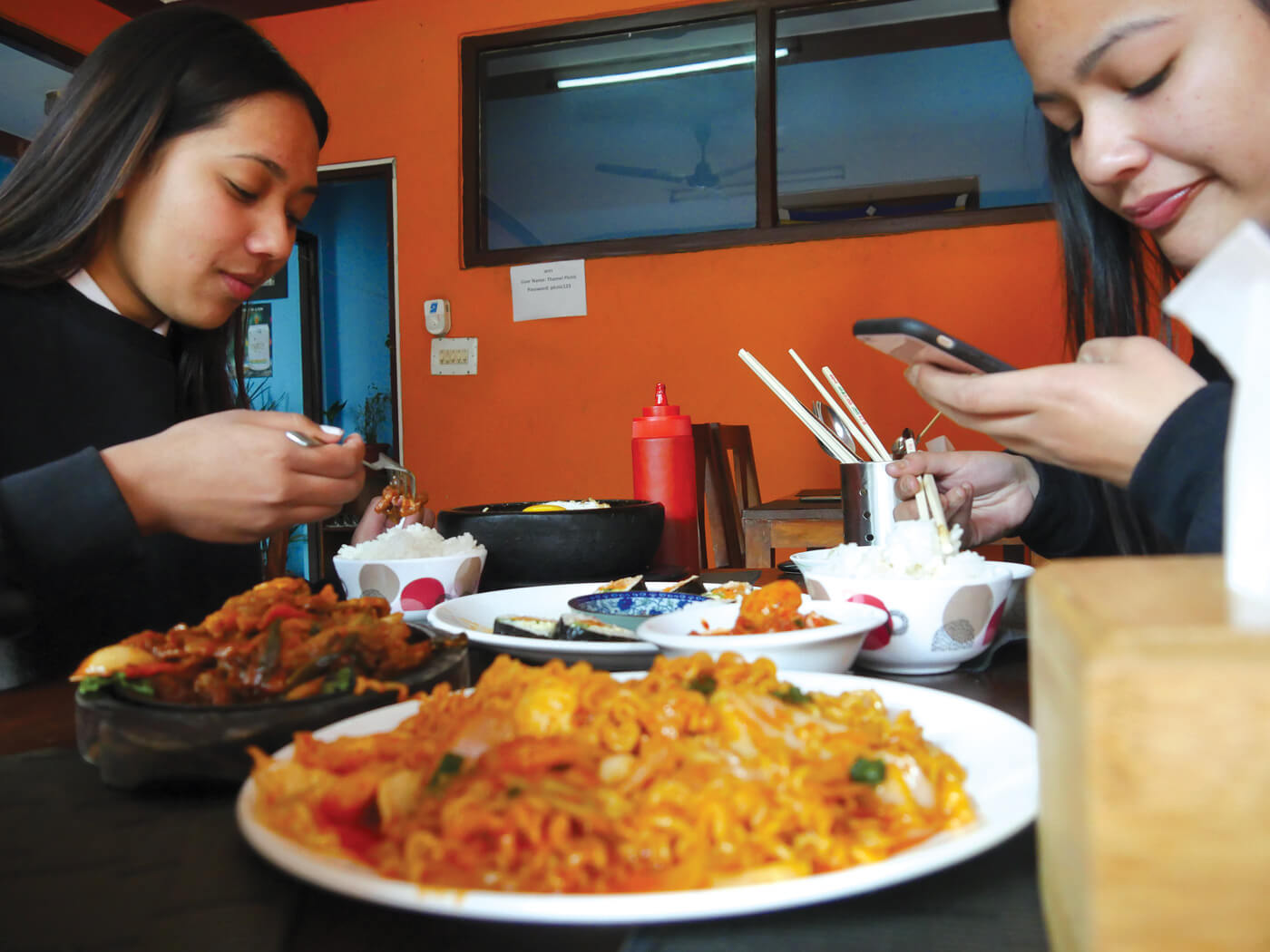K-Pop in K-Town
Susmita Silwal is from a younger generation of Nepalis that is addicted to Korean pop music and television serials. She has taught herself to write her name in Korean, and introduces herself confidently in Korean.
Like many of her peers, Silwal did not learn all this in class, but on YouTube and Facebook. This week, she was attending another cultural event organised by the Korean aid agency, KOICA, in Patan. She never misses any of them.
“I can read, speak and even write Hangul a little bit. I love everything about Korean culture, and want to visit, it will be my dream vacation,” she said, while Baik Hyeseung of KOICA’s volunteer program looked on.
“We are amazed that today’s event has an even greater turnout than expected,” Hyeseung said, adding that his agency would look for a bigger venue next time.
With the growing popularity of K-pop worldwide, the Oxford Dictionary officially added the term ‘K-pop’ in 2012, defining it as Korean pop music and culture. Like the rest of Asia, the Korean wave has also washed ashore in Kathmandu, 4,000km away from Seoul.
Read also: Move aside Bieber and Bollywood, Bhrikuti Rai
Little Korea in Kathmandu, Seulki Lee

Even before the recent Internet boom in Nepal, Korean television serials like Dae Jang Geum (2003) or Winter Sonata (2002) starring Bae Yongjoon were already popular through DVD rentals, and Boys over Flowers (2009) became the rage among younger Nepalis attracted by glamorous young Korean stars. Suddenly, the young Kathmandu crowd started dressing, eating, moving, and having the same hair styles as their Korean idols.
“Five years ago when I started this shop, Korean cosmetics were not as popular as American or Indian brands,” says Romesh Thapa of Dasom Cosmetics in Darbar Marg. “Today, K-beauty products are catching on and customers come asking for items they have searched online.”
Thapa says the reason for the new fashion trend is the popularity of K-pop music and movies. “Our customers look for skin care products and BB cream to achieve natural beauty like Korean actresses or singers,” he explained.
A salesperson, Nilam Rai, who is working in Misumi Cosmetic Nepal at Labim Mall, uses more than ten K-beauty products from eyeliner pencils to sunblock. Rai says “I do not like heavier makeup because it irritates my skin. But Korean cosmetics like Missha and The Face Shop are good for me.”
Read also:
Korea Kafala, Oma Astha Rai and Seulki Lee
Doing it the right way, Seulki Lee

With the proliferation of Korean restaurants in Kathmandu, and more Nepalis returning from Korea, the spicy and strong flavour of Korean food also seems to appeal increasingly to the Nepali palate.
Korean stir-fried pork Jeyuk-Bokkeum and Tteok-bokki (spicy rice cakes) are the popular menu items in Korean Kitchen Picnic in Kathmandu. A kitchen staff Saroj Lama says 60% of his customers are Nepalis.
At one of the tables is 18-year-old high school student Priyanka Shrestha, who says she loves spicy Korean cuisine, and comes here once a week with friends. She is also a big fan of K-dramas and Korean actors, especially Kim Hyunjoong who played Yoon Jihoo in Boys Over Flowers.
Neha Tamrakar and Shriya Maharjan are co-administrators of the fan group BTS ARMY in Nepal for the Korean boy band, BTS, and recently held a charity event to raise money for the Chepang community.
Read also:
Koran movement gains political foothold in Nepal, Seulki Lee

“We posted about donating to those kids on our Facebook page, and many ARMYs chipped in, so, we decided to collect clothes and funds,” Tamrakar told us. BTS ARMY has also collaborated with other K-pop fans to hold a ‘Flood Donation Campaign’ in August. The inspiration comes from BTS which has lyrics with messages like ‘Love yourself even though the world does not recognise you’.
Says Maharjan: “We are so inspired by BTS we will continue to do more fundraising campaigns.”
Irtika Bajracharya is an art and design student and is hooked on K-pop just like her school mates who listen to BTS songs and dance to its music in distress.
“I am surprised K-pop has become more popular than Bollywood and Western culture, K-pop just feels more natural here,” Bajracharya says. “the aesthetics of K-pop with storylines in its dance and lyrics is very creative. It helps me grow up as a person.”
Read also:
Chandra Kumari is happy now, Ramyata Limbu
From aid to investment, Seulki Lee





